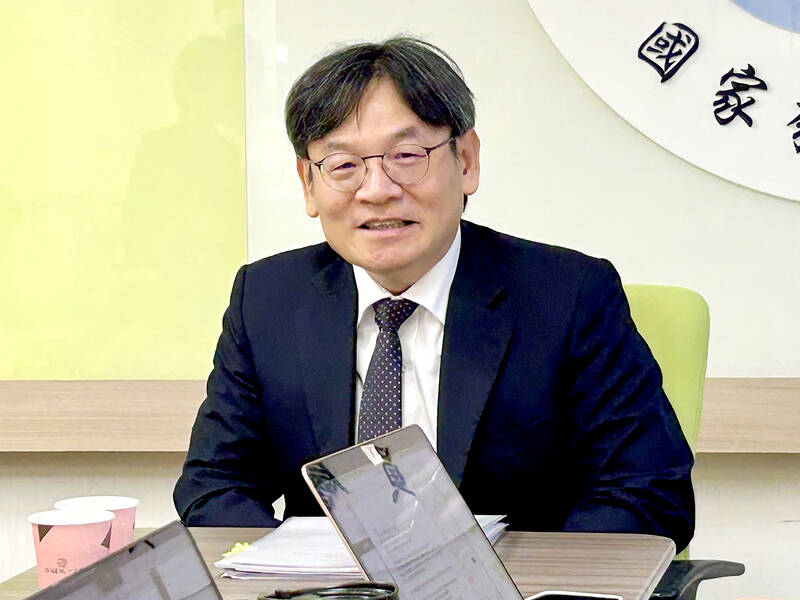National Development Council (NDC) Minister Yeh Chun-hsien (葉俊顯) yesterday attributed a forecast that Taiwan would overtake South Korea in GDP per capita to the success of Taiwan Semiconductor Manufacturing Co (TSMC, 台積電) and a boom in artificial intelligence (AI) applications.
Yeh’s comments came after the Korea Economic Daily on Sunday reported that Taiwan is expected to surpass South Korea in GDP per capita this year for the first time in 22 years, citing forecasts from agencies in both nations.
Taiwan’s GDP per capita would be US$38,066 this year, compared with South Korea’s expected US$37,430, the newspaper reported.

Photo: Wu Hsin-tien, Taipei Times
Yeh told reporters he foresaw several years ago that Taiwan had great potential to overtake South Korea in GDP per capita.
TSMC has played a critical role in the GDP competition with South Korea, as the contract chipmaker has cemented its lead in the global pure foundry business — a lead expected to continue for at least the next five to 10 years, he said.
Taipei-based advisory firm TrendForce Corp (集邦科技) said in a report last month that TSMC’s global market share rose to a record 70.2 percent in the second quarter of this year, up from 67.6 percent in the first quarter, on the back of the fast-growing AI sector.
TSMC has left Samsung Electronics Co’s foundry business far behind in second, with the South Korean firm having a 7.3 percent share, TrendForce said.
TSMC, as a contract chipmaker without launching its own brand, has won the trust of its customers by never competing with them and providing tailored products to satisfy their needs, while its work culture has also contributed to its success, Yeh said.
In addition, government restrictions on technology exports have protected Taiwan’s tech industry from foreign competition and allowed companies such as TSMC to maintain their global lead, he said.
Taiwan’s tech firms have positioned themselves well in price negotiations with customers in advanced processes, semiconductors and AI devices, he said.
“Even though the New Taiwan dollar appreciated against the US dollar, Taiwan’s niche products have still given exporters bargaining chips in price negotiations,” Yeh said.
As global demand for AI applications remains solid, TSMC and Taiwan’s economy as a whole would continue to benefit this year, he said.
“It is very possible that local GDP growth would top 4 percent this year,” Yeh said.
The Directorate-General of Budget, Accounting and Statistics has forecast that Taiwan’s GDP growth this year would be 4.45 percent, up from an earlier estimate of 3.10 percent.
South Korea has invested heavily in China and depends significantly on the Chinese market, so a supply glut among Chinese firms has hurt South Korean companies and affected South Korea’s GDP, Yeh said.
In addition, some South Korean products have been replaced by Chinese goods, particularly in the auto industry, while Taiwan’s technology export restrictions have helped TSMC continue to grow, he added.

CHAOS: Iranians took to the streets playing celebratory music after reports of Khamenei’s death on Saturday, while mourners also gathered in Tehran yesterday Iranian Supreme Leader Ayatollah Ali Khamenei was killed in a major attack on Iran launched by Israel and the US, throwing the future of the Islamic republic into doubt and raising the risk of regional instability. Iranian state television and the state-run IRNA news agency announced the 86-year-old’s death early yesterday. US President Donald Trump said it gave Iranians their “greatest chance” to “take back” their country. The announcements came after a joint US and Israeli aerial bombardment that targeted Iranian military and governmental sites. Trump said the “heavy and pinpoint bombing” would continue through the week or as long

TRUST: The KMT said it respected the US’ timing and considerations, and hoped it would continue to honor its commitments to helping Taiwan bolster its defenses and deterrence US President Donald Trump is delaying a multibillion-dollar arms sale to Taiwan to ensure his visit to Beijing is successful, a New York Times report said. The weapons sales package has stalled in the US Department of State, the report said, citing US officials it did not identify. The White House has told agencies not to push forward ahead of Trump’s meeting with Chinese President Xi Jinping (習近平), it said. The two last month held a phone call to discuss trade and geopolitical flashpoints ahead of the summit. Xi raised the Taiwan issue and urged the US to handle arms sales to

State-run CPC Corp, Taiwan (CPC, 台灣中油) yesterday said that it had confirmed on Saturday night with its liquefied natural gas (LNG) and crude oil suppliers that shipments are proceeding as scheduled and that domestic supplies remain unaffected. The CPC yesterday announced the gasoline and diesel prices will rise by NT$0.2 and NT$0.4 per liter, respectively, starting Monday, citing Middle East tensions and blizzards in the eastern United States. CPC also iterated it has been reducing the proportion of crude oil imports from the Middle East and diversifying its supply sources in the past few years in response to geopolitical risks, expanding

Pro-democracy media tycoon Jimmy Lai’s (黎智英) fraud conviction and prison sentence were yesterday overturned by a Hong Kong court, in a surprise legal decision that comes soon after Lai was jailed for 20 years on a separate national security charge. Judges Jeremy Poon (潘兆初), Anthea Pang (彭寶琴) and Derek Pang (彭偉昌) said in the judgement that they allowed the appeal from Lai, and another defendant in the case, to proceed, as a lower court judge had “erred.” “The Court of Appeal gave them leave to appeal against their conviction, allowed their appeals, quashed the convictions and set aside the sentences,” the judges